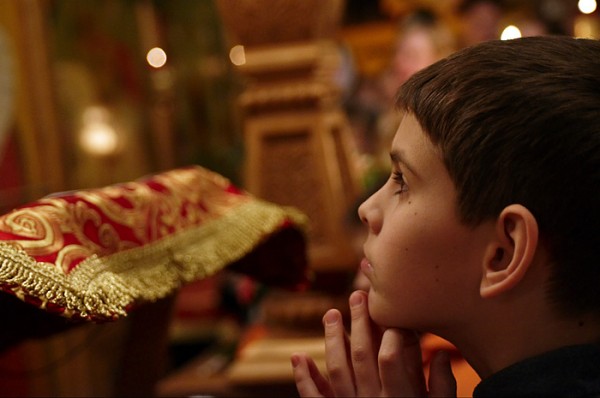When we speak about spiritual or religious things, all too often we use words without truly understanding their meaning. We speak of love, for example, but how many pause to ponder what it actually is? As priests, we repeat Christ’s commandments like a mantra to our parishioners: “Love God, love your neighbor, and love your enemies.” And our parishioners get the hint; they come back to us during confession and confess the sin of not having enough love. How many priests and parishioners ever stop to wonder just how one is to get more love? By being ‘nice’ (whatever this means)? No, this is not love, this is just being ‘nice.’ By being kind? No, kindness is very good, but it is different from love. By being polite? This very useful trait seems even further from the nature of love than is kindness. Perhaps by helping others? This also is not love, per se. What kind of commandment is it–to love–when there does not seem to be a good way to fulfill it, let alone an “easy and light” one (cf. Matt. 11:30)?
Love is a strange, irrational, and illogical thing. I love a close relative, whom I do not necessarily like, with whom I am neither particularly kind or polite, and toward whom I do not even try to be ‘nice.’ Yet, I love him. And then there is my neighbor. He is a nice guy; I do try to be both ‘nice’ and polite–even kind, given an opportunity–and I would most certainly help him if he ever needed my help. But I do not love him. And he is not even my enemy!
Now, about loving my enemies… Having dabbled enough in theology, I think I know what this commandment actually means– to love one’s enemy. I can even explain it to other people. But how many people actually think about what it means? And so, they come back time and time again, confessing in one breath the sins of accidentally (?!) eating cheese during Lent and not having enough love for their enemies, or anyone else, for that matter, without understanding what this means or how to improve the situation.
Joy may be another one of those words that we use but rarely understand. What is joy? Is it that feeling when one wants to jump, and dance, and laugh, and sing, and hug everyone, and skip around with arms flailing in the air as if one has just won a lottery? Perhaps this could be part of it, but why, then, are most of our saints not known for this type of behavior? In fact, on the surface, they may be mistaken for feeling the exact opposite of what makes one jump, laugh, sing, and the rest. So, are we to be joyful or sorrowful? After all, those that mourn are blessed. And yet, joy is one of the fruits of the Spirit, along with love (Gal. 5:22); the state into which the righteous will enter is referred to as ‘the joy of the Master’ (Matt. 25:21); and the sorrow of Christ’s disciples living in the world is to turn into joy (John 16:20). What is this joy? Can we have any understanding of it that is a bit more clear than “that feeling when one wants to jump”?
Natural Joy
One of the simplest examples of what we call ‘joy’ is, in fact, “that feeling.” It is the feeling of very basic emotional excitement, which can be easily mistaken for a spiritual state. One can get goosebumps during the singing of “Christ is Risen” on Pascha and assume that this feeling is spiritual joy–an assumption which may be just as false as one that assigns spiritual meaning to the lump in the throat and teary eyes during the “burial of Christ” on Great Friday. Emotions are part of our human nature, and we should not think of them as bad, but neither should we see them as indicative of anything spiritual.
An emotional response to church hymns is just as natural as one that is evoked by Tchaikovsky’s “1812” symphony or by a beautiful sunrise. Our emotions are to be sanctified by our faith and the life of the Church, along with our minds, bodies, will, etc. But emotions are fleeting, ever-changing, easily manipulated even by other people, and, I suspect, more so by the “enemies invisible.” This make our joyful emotions an unlikely candidate for the full meaning of the joy which comes from communion with Christ.
Joy of Salvation
Another kind of joy is the joy of a person being saved. Imagine a person who is drowning. If someone were to throw him a rope and yell: “Hold on! I will pull you out!”–the person will likely experience a sense of joy. There is nothing particularly beautiful or pleasant about the rope, the person in trouble and his rescuer do not have a relationship and do not even know each other’s names, and yet the sinking man will be very glad to see both the rescuer and the rope. A similar feeling of joy may be experienced by a patient who has a deadly illness and needs a complicated and risky surgery. If, upon waking up from anesthesia, he hears the doctor say, “All went well. You will recover,” he will feel much joy.
It is the same in our relationship with Christ. If we see ourselves in the condition that truly afflicts us, if we realize that we are perishing in our sinfulness, if we understand that we are sinking in our passions, and if we feel the deadly illness spreading through our being; in other words, if we truly comprehend our helplessness and hopelessness in the face of the corruption which afflicts our nature–then the Gospel becomes the Good News for us, then we experience joy when we meet our Savior. In fact, it is only then that we are even capable of accepting Christ as our Savior. If we do not see ourselves in need of salvation, then we cannot accept Christ as the Savior, even if we say the word. If I know that I have cancer, then the oncologist becomes my doctor. If I do not know that I have cancer, then the doctor is just some doctor, but not my doctor. This brings us to yet another source of joy. The joy of being saved is a necessary component of a life in Christ, but this joy is imperfect; it is the joy of desperation; it is joy that is not free. There is yet another, more intimate, more perfect source of joy–the free joy of a heart in love.
Joy of Communion
When we are in love, we feel joy when we are with the person we love. We even feel joy when we merely think about the person we love, when we merely get a glimpse, when we but anticipate a thought in return, a glance, touch. This is perfect joy: the joy of being with Christ, not because He is “good for food, a delight to the eyes, and makes me wise,” but because I love Him; not because He threw me a rope, but because I love Him; and not because He is the oncologist who is saving me from a deadly cancer–which He is–but because I love Him and am joyfully willing to trade an eternal cancer-free life for one minute with Him, in His presence. This joy is the fruit of love, irrational, unconditional love–the love that is “patient and kind; that is not jealous or boastful; that is not arrogant or rude; that does not insist on its own way; that is not irritable or resentful; that does not rejoice at wrong, but rejoices in the right; the love that bears all things, believes all things, hopes all things, endures all things.”
When Adam and Eve sinned in the Garden, they were ashamed of being naked and covered up with leaves. This is a rather odd thing: they were the only two humans on the planet, they were told to be fruitful and to multiply, they were naked before and were not ashamed in the least–and why should they have been? One is not ashamed of someone with whom he shares an intimate connection. But this connection was broken; Adam and Eve suddenly felt alone, cut off, separated; and now for Adam, Eve became the Other, and likewise, for Eve, Adam became the Other. What is even more devastating is that for them, God became the Other–He was no longer the voice in Adam’s heart, but someone walking off at a distance, from whom Adam and Eve decided to hide among the trees. They became cut off, separated from God, they “killed” His presence in their hearts in the same way that the prodigal son “killed” his father, took his inheritance, and left to “hide among the trees.”
The restoration of the broken communion of the two loving hearts, the return of the prodigal, is a source of joy for both the son and the father, the man and God: “And he arose and came to his father. But while he was yet at a distance, his father saw him and had compassion, and ran and embraced him and kissed him… And they began to make merry.” The son did not expect anything, not even to be accepted back as a son; the father did not demand anything. They were just joyful to see each other again. Perfect love produces perfect joy.
Joy of Liturgy
When we gather together for the sacrament of the Eucharist, it is not yet the feast in the Father’s house, it is not yet the fulfillment of everything. Thus, we pray in the Liturgy that we may partake of God “more fully in the unwaning day” of His kingdom, but we are also no longer with the pigs in a faraway land. The Liturgy is that moment when, from a distance, we see the Father, He sees us, and our heart is filled with joy and trepidation, and we do not know whether He will accept us even as a hired servant, but we are joyful to be home, and joyful to see the Father, even if from a distance. And the Father, seeing us still from a distance, runs to greet us and to embrace us. We have not yet entered the festal hall, but we are already sharing an embrace, a connection, a communion; we already experience the joy of being together, of being once again one family.
The connection and love which we experience with members of our family is a mystery in every sense of the word. We do not always treat our family members well, and we do not always like them, but we love them, we feel that we are one–one family. On the other hand, we do not love our enemies, even if we try to treat them well, and even if we actually like them. This is easy to illustrate. Someone we love, someone from our own family, may win the lottery or get a promotion, and we feel joy, as if we ourselves had won the lottery. But if an enemy gets a promotion, we do not feel any joy. We are happy enough to fulfill what we think is our Christian duty to help our enemy when he is in need and even to wish him well–albeit, hypothetically. But when he is actually well we are not overwhelmed with joy. So, this is the test of love–to love my enemy, not when he is down, but when he is well. The only way to have this love is to see the basic connection between all humans as members of one human family, to see them not as Others but as Us.
The restoration of the family unity of humans and the unity of man with God can be the only source of true love and true joy. “Pray then like this: Our Father…” “I am the vine, you are the branches…” One family. One living organism. The very act of recognizing the person in front of me as a beloved family member produces joy. “My joy!”–Saint Seraphim of Sarov greeted those who came to him. “My joy!” The Liturgy is the path to this love and this joy, if only we pay attention. Every Liturgy is a “small” Pascha, and the formula of the love of unity is heard in the Paschal stichera: “…let us embrace one another; let us say ‘brethren’ even to them that hate us…” This is the Christian view of enemies: let us say “brethren” even to those that hate us–not “let us help them when they are in need,” or “let us be nice to them,” but let us be one with them, one family. The source of joy of a life in Christ is that life in Christ is nothing less than the coming-together of long-lost prodigals back into one family in the Father’s house.
Alexander Schmemann
In his focus on the Liturgy as the basic and most important principle of a Christian life, Father Alexander Schmemann may have been expressing his deeply personal experience. In his foundational work titled The Eucharist: Sacrament of the Kingdom (SVSP, 2003), Schmemann wrote:
For more than thirty years I have served the Church as a priest and a theologian, as a pastor and a teacher. Never in those thirty years have I ceased to feel called to think about the eucharist and its place in the life of the Church. Thoughts and questions on this subject, which go back to early adolescence, have filled my whole life with joy… (9)
And this was not a careless comment which can be overlooked. In his 1982 lecture on Liturgy and Eschatology delivered at Oxford, Schmemann places the question of joy at the very center of the task of theology:
The joy of the Kingdom: it always worries me that, in the multi-volume systems of dogmatic theology that we have inherited, almost every term is explained and discussed except the one word with which the Christian Gospel opens and closes. “For behold, I bring you tidings of great joy” (Luke 2:10) – so the Gospel begins, with the message of the angels. “And they worshiped Him and returned to Jerusalem with great joy”(Luke 24:52) – so the Gospel ends. There is in fact no theological definition of joy. For we cannot define that sense of joy which no one can take away from us, and at this point all definitions are silent. Yet only if this experience of the joy of the Kingdom in all its fullness is again placed at the centre of theology, does it become possible for theology to deal once more with creation in its true cosmic dimensions, with the historic reality of the fight between the Kingdom of God and the kingdom of the prince of this world, and finally with redemption as the plenitude, the victory and the presence of God, who becomes all in all things.
Thus, for Schmemann, joy is the fruit of the personal experience of the Kingdom of God, of the immediate presence of God. Love, unity and the resulting joy, according to Schmemann, are to be found in the Liturgy of the Church:
The bread on the paten and the wine in the chalice are to remind us of the incarnation of the Son of God, of the cross and death. And thus it is the very joy of the Kingdom that makes us remember the world and pray for it. It is the very communion with the Holy Spirit that enables us to love the world with the love of Christ. The Eucharist is the sacrament of unity and the moment of truth: here we see the world in Christ, as it really is, and not from our particular and therefore limited and partial points of view. (For the Life of the World: Sacraments and Orthodoxy)
Joy, according to Schmemann, is the very nature of the Eucharistic Liturgy:
Once more, the joyful character of the eucharistic gathering must be stressed. … The liturgy is, before everything else, the joyous gathering of those who are to meet the risen Lord and to enter with him into the bridal chamber. And it is this joy of expectation and this expectation of joy that are expressed in singing and ritual, in vestments and in censing, in that whole ‘beauty’ of the liturgy which has so often been denounced as unnecessary and even sinful. (For the Life of the World)
The reality of the situation in our parishes, however, seems to be somewhat different. Sure, we talk about joy, and some people can be seen acting in what appears to be a joyful manner, especially on Pascha. But day to day, our concerns with the ritual of the service seems to overwhelm the joy of meeting the risen Lord. At best, we feel the emotional joy sparked by the beauty of the singing or by being a part of an excited crowd of people. But the joy of an intimate communion with Christ is not so much what happens when the Church choir takes a fortissimo approach to “Christ is risen,” but what happens in the pianissimo moments. Saint Seraphim of Sarov partook of holy communion in church, but maintained the joy of that communion both on the road back to his hermitage and when greeting pilgrims who came to him on any day of the week and the year. Saint John of Kronstadt wrote of the joy of the liturgical experience which he felt quite outside of the ritual of the Liturgy in his diaries. There was a time in the early history of the Church when Christians received a portion of the Holy Gifts and carried them to their homes. We no longer do this. Perhaps this tradition should be resurrected and transformed into receiving the joy of the Lord into our hearts and carrying it back to our homes and the rest of our lives.

















